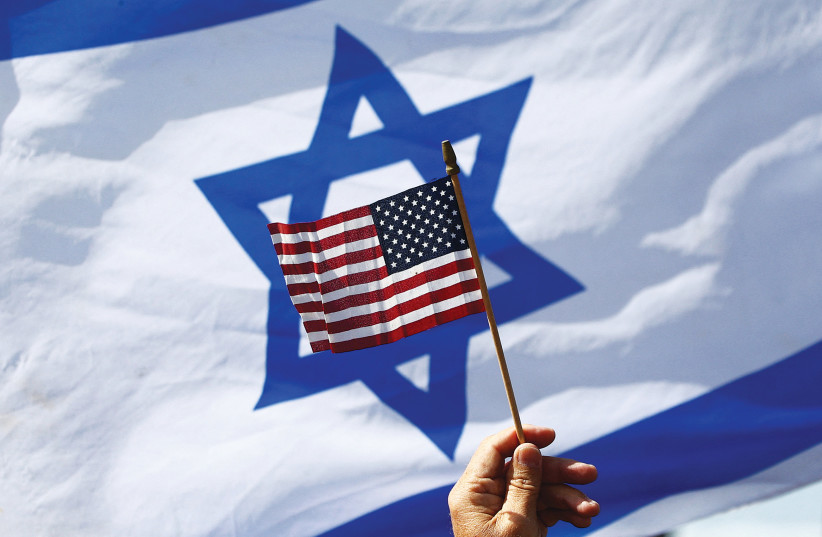by Avi Mayer
The US and Israel have common values and common interests with many other fellow democracies. This relationship seems to go much deeper.
 |
JERUSALEM SCHOOLCHILDREN hold Israeli and American
flags during a rehearsal for former US President Barack Obama’s visit to
Israel in 2013.
(photo credit: BAZ RATNER/REUTERS)
|
I am writing these words while flying back to Israel from a brief visit to Washington, DC. It is oppressively hot and unbearably humid in DC at this time of year, but as I strolled through Capitol Hill earlier this week, the white sandstone of the US Capitol glistened against picture-perfect blue skies and the National Mall was a beautifully verdant green. It was the stuff of postcards and I walked around with the West Wing theme music playing in my head.
I spent several days meeting with congressional leaders, both Democrats and Republicans, and administration officials, as well as with groups that study and seek to shape US policy vis-à-vis Israel. Having spent quite a few years living, studying, and working in and around Washington, I am familiar with the way in which Israel has traditionally been discussed in the city. But as an observer of US politics and of the US-Israel relationship in recent years, I had braced myself for ominous talk of a growing partisan divide over Israel, of increased skepticism over defense aid and other forms of support for the Jewish state, of extremists hijacking the conversation and driving policy in troubling directions.
Surprisingly, and happily, that’s not what I heard. While there was general acknowledgement that there are voices on the margins of both parties trying to tug the US away from Israel, virtually all of my interlocutors on both sides of the aisle emphasized that those voices remain firmly on the margins and that Israel remains an area of broad bipartisan agreement – one of very few in America today.
Even when pushed on differences between the sitting American and Israeli governments, the impact of the judicial reform legislation and the ongoing protests surrounding it, differing approaches to the Iranian nuclear issue, and other areas of current or potential friction, they stood firm: the state of the US-Israel relationship remains strong, they said, and it is only going from strength to strength.
I heard excitement about making America more accessible to Israelis by incorporating Israel into the US visa waiver program, hope of expanding the Abraham Accords to encompass additional countries in the region, anticipation of closer cooperation between the American and Israeli tech sectors on areas ranging from artificial intelligence to renewable energy, and confidence that the US and Israel will work together to counter the threat posed by Iran and its terrorist proxies.

Contrary to what certain pundits might say, never once did any of my interlocutors indicate that America is anywhere near “reassessing” its ties with Israel. Much to the contrary: they suggested that the best days of the relationship between the two countries are still ahead of us.
As I went from one meeting to the next, I found myself pondering the source of the US-Israel alliance’s durability. Yes, we share common values and common interests, as our national leaders remind us at every opportunity. But the US and Israel have common values and common interests with many other fellow democracies. This relationship seems to go much deeper.
I thought back to last week, when I joined more than 2,000 of my closest friends in celebrating America’s 247th Independence Day at the Israel Museum in Jerusalem. While pretty much every embassy in Israel hosts a reception for its national day, no event is larger and no ticket hotter than the US embassy’s Fourth of July extravaganza. As we slid around on the gravel of the museum’s sculpture garden, happily sipping sweet Jack Daniel’s cocktails and munching on kosher McDonald’s Big Macs, it felt, curiously, as though those in attendance weren’t celebrating a foreign country’s independence day so much as their own.
Israelis don’t just feel an affinity for America – they deeply love it. And, in some respects, they’re more pro-America than Americans themselves.
A recent global survey by the Pew Research Center found that Israelis have a more positive view of the United States than does almost any other nation in the world. A staggering 87% of Israelis say they view America favorably; only Poles said so in slightly larger numbers. Citizens of close US allies like Canada, the United Kingdom, Australia, and Germany lagged far behind.
But when it comes to America’s role in the world, Israelis view certain aspects of American global leadership more favorably not only than most other nations – but than Americans, too.
As this paper’s Lahav Harkov reported at the time, roughly three out of every four Israelis (74%) believe the United States contributes to peace and stability around the world; only 69% of Americans believe the same; 94% of Israelis have a positive view of the American military, compared to 75% of Americans; 71% of Israelis believe the United States is a more democratic society than other wealthy countries, more than any other nation in the world; only 60% of Americans had a positive view of American democracy relative to other countries.
Americans love Israel and Israelis love the US
The love is very much mutual.
A 2021 poll conducted by Gallup found that three quarters of Americans (75%) had a favorable view of Israel – the highest figure in thirty years. A Pew survey from last year found that two-thirds of Americans (67%) have a positive view of the Israeli people. Surveys conducted by the American Jewish Committee (AJC) have found that more than eight-in-ten Americans view anti-Zionism – that is, denying Israel’s right to exist – as a form of antisemitism (full disclosure: I oversaw those surveys in my previous role as an AJC executive).
American elected officials support the US-Israel alliance not only because it’s good policy to do so – though, of course, it is – but because it’s good politics. America supports Israel because Americans do.
As former Israeli ambassador to the United States Michael Oren writes in his seminal book, Power, Faith, and Fantasy, the notion of Jewish sovereignty in the Jewish people’s homeland has captured Americans’ imagination for as long as America has existed. The sheer number of American towns that trace the origins of their names to Israel, of communities and individuals who feel a deep emotional and religious attachment to the Jewish state and its people, is overwhelming, and it speaks to the remarkable role that Israel plays in the lives and consciousness of so many Americans.
When Americans look at Israel and when Israelis look at America, they see themselves: two democracies that came into being under trying circumstances and have persevered despite crushing odds; nations of innovators and entrepreneurs, of farmers and philosophers; societies rooted in deep and enduring values that seek to do right not only by their own people but by the world.
More than shared interests, even more than common values, America and Israel are bound to one another by the mutual love of their respective peoples, and it is that deep and abiding sense of attachment that will enable the two nations – and the bond between them – to weather any storm.
Avi Mayer
Source: https://www.jpost.com/opinion/article-750066
No comments:
Post a Comment